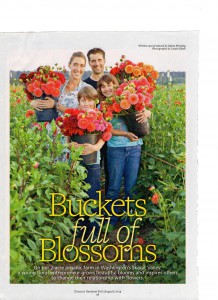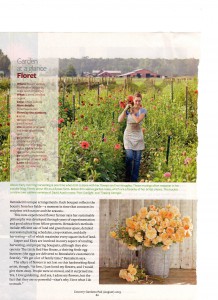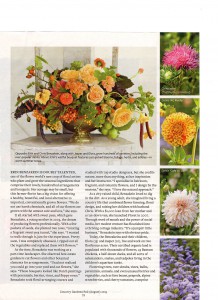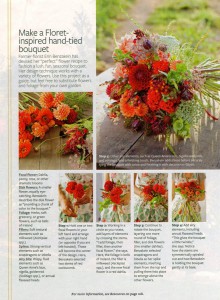Buckets full of Blossoms
On her 2-acre organic farm in Washington's Skagit Valley, a young floral entrepreneur grows beautiful blooms and inspires others to change their relationship with flowers.
Produced and written by Debra Prinzing | Photographed by Laurie Black
Country Gardens Fall 2013

The venture involves everyone in the Benzakein family, including parents Erin and Chris and their children, Jasper (10) and Elora (13).
Erin Benzakein is doubly talented, one of the flower world’s new crop of floral artists who plant and grow the seasonal ingredients that compose their lovely, hand-crafted arrangements and bouquets.
Her acreage maybe small, but this farmer-florist has a big vision for offering a healthy, beautiful and local alternative to imported, conventionally-grown flowers. “We do not use harsh chemicals and all of our flowers are grown with the utmost care and love,” she says.
It all started with sweet peas, which gave Erin, a young mother in 2003, the dream of producing flowers professionally. With a few packets of seeds, she planted two rows, “creating a fragrant, sweet pea tunnel,” she recalls. “I wanted to walk through it, just for the experience. Pretty soon, I was completely and utterly obsessed. I ripped out all the vegetables and replaced them with flowers.”

Early-morning harvesting is one time when Erin is alone with her flowers and her thoughts. Those musings often reappear in her popular floret blog about life on a flower farm.
At the time, Erin was working as a part-time landscaper. She observed how estate gardeners cut flowers and other botanical elements for arrangements. “I not realized you could go into your yard and cut flowers — those bouquets looked like Dutch paintings with perennials, berries, vines and floppy roses.”
Erin took floral arranging courses and studied with some of the top studio designers around, but more than anything, she credits nature as her inspiration and her instructor. “I specialize in heirloom, fragrant and romantic flowers, and I design by the seasons,” she explains. “I love the natural approach.”
Putting down roots
As a city-raised child Erin loved to dig in the dirt. As a young adult, Erin imagined living a country life that combined flower farming, floral design and raising her children with husband Chris. With a $1,000 loan from her mother and a run-down Euro van, she launched floret in 2007. Through word of mouth and the power of social media, her modest venture has flourished into a thriving cottage industry. “It’s a jumpin’ little business,” Erin says with obvious pride.

Erin created this wistful bouquet at the height of the season when flowers, foliage, herbs and edibles — in warm, summer tones — were in abundance on her farm.
Today, Erin, Chris and their children, Elora (13) and Jasper (10), live and work on two floriferous acres. Their certified organic land is populated with thousands of flowers, 25 Bantam chickens, a half-dozen ducks and all sorts of salamanders, snakes and tadpoles living in the children’s aquarium tanks.
Flowering trees, rare shrubs, vines, bulbs, perennials, annuals (including those sweet peas) and even unusual berries and vegetables like fava beans, pea pods, alpine strawberries and cherry tomatoes, comprise Erin’s unique arrangements. Each bouquet reflects the bounty from her fields — a moment in time that connects its recipient with nature and the seasons.
This now-experienced flower farmer says her sustainable philosophy was developed through years of experimentation and good advice from fellow growers around the country. Erin’s methods include efficient use of land and greenhouse space, detailed succession planting schedules, crop rotation and daily harvesting — all of which maximize every square inch of land.
“In the spring, I till in my cover crops, add a nice dose of compost, a dressing of organic fertilizer and plant my crops,” she explains. “After a crop is done blooming, I pull it out, add another dose of compost, fertilize and replant with another crop. This enables me to grow up to three times the amount of flowers on my land in a single growing season.”
If the climate and growing conditions are ideal, Erin is able to harvest for nearly eight months of the year, beginning with early flowering bulbs and anemones in the spring and continuing through late fall when frost hits the last dahlia crops. The “off season” is devoted to planning, marketing, writing and teaching, she says.
From field to vase, hands and lapels
 Carried down the aisle by joyous brides or worn on the lapels of handsome grooms, floret’s wedding flowers are breathtakingly beautiful. Erin designed for 17 weddings last summer and she expects that number to grow this year. Local natural food markets, including Whole Foods stores in Washington, Oregon and British Columbia, sell cheery sunflower and perennial bunches by the hundreds, while a steady stream of Seattle fans subscribe to weekly fresh bouquets, similar to food CSA subscribers.
Carried down the aisle by joyous brides or worn on the lapels of handsome grooms, floret’s wedding flowers are breathtakingly beautiful. Erin designed for 17 weddings last summer and she expects that number to grow this year. Local natural food markets, including Whole Foods stores in Washington, Oregon and British Columbia, sell cheery sunflower and perennial bunches by the hundreds, while a steady stream of Seattle fans subscribe to weekly fresh bouquets, similar to food CSA subscribers.
For those who don’t live close by, Erin shares both her blooms and the “farm life” through her blog, a personal journal of thoughts and images that has captured the imaginations of would-be flower farmers and designers around the globe.
It’s easy to romanticize the image of a flower farmer, but Erin speaks honestly about the grueling hours, especially during the peak summer season. “Chris comes home from work as a VW mechanic and helps me make bouquets; then he gets up early two or three days a week to make deliveries to Seattle, which is 65 miles away,” she says. Erin is up at dawn, harvesting flowers Monday, Wednesday and Friday; making bouquets on Tuesday and Thursday. Weekend weddings add another design day to the schedule.
Jasper and Elora are involved in every aspect of tending, harvesting and preparing bouquets, although they also operate “The Little Red Hen House,” a thriving fresh egg business (the eggs are delivered to Erin’s fresh bouquet customers in Seattle). “We get a lot of family time,” Erin points out.
The allure of flowers is not lost on this hardworking floral artist, though. “At first, I just loved my flowers and I would give them away. People were so moved and it surprised me. Yes, I love gardening. And yes, I adore my flowers, but the fact that they are so powerful – that’s why I love what I do so much.”
floret-by-the numbers
- 2 acres
- 10 hoop houses/green houses
- 260 varieties of annuals and herbs grown from seed
- 30 varieties of ornamental shrubs form a hedgerow, planted for their blooms and as wildlife habitat
- 150 garden rose shrubs
- 40 varieties of perennials
- 45 varieties of sweet peas
- 3,000 dahlia plants (about 250 varieties)
About floret
Where: Mount Vernon, Washington (about 65 miles north of Seattle)
What: 2 acres, certified organic
Zone: USDA Zone 8a
More details: www.floretflowers.com








